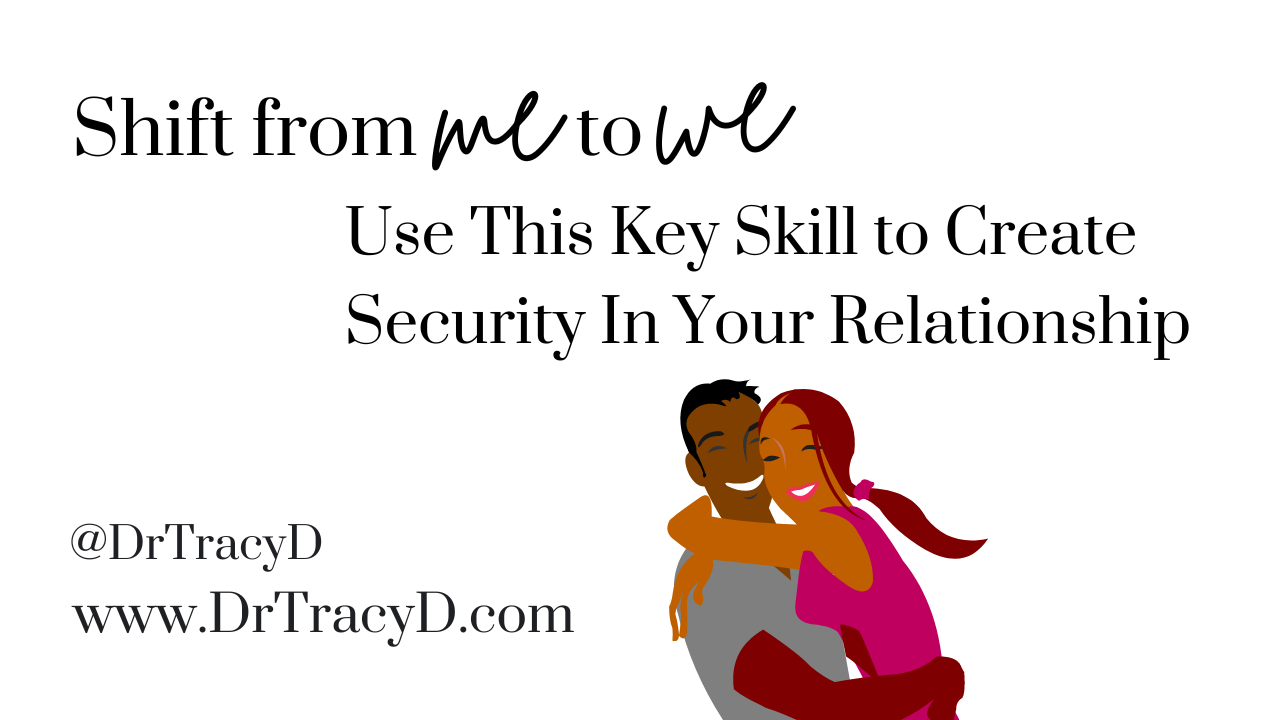Shift from ME to WE: Use this Key Skill to Create Security In Your Relationship

When it comes to relationships, there are two different people (plus the dynamic, but we’ll save that for another day) that make up the couple unit. Within this, we must acknowledge that you and your partner are separate - that you each have your own internal worlds that consist of:
- Experiences
- Emotions
- Desires/Wishes
- Problems
The challenge? We spend a lot of time in an egocentric space, only viewing the world from our own lens. We are ready to respond with our own opinions. We are prepped to tell the other person what they should or shouldn’t do. We tell them how something is, because it’s the way we experience it.
Hanging out in this space comes at a cost: it loses the “we” in our relationship. We must consider that you and your partner have different internal experiences, and your job as a couple is to co-create your world (My favorite practical lesson inside Be Connected is my How to Compromise lesson)
But how do we actually create the “US” in a relationship?
One key skill to learn is responsiveness.
What is responsiveness? And why is it so important?
Responsiveness is the act of acknowledging and validating your partner’s internal world (keeping in mind those four elements above– their experiences, emotions, preferences, and problems). We all have the basic need to know that the person we love is there for us and that we matter to them. This is the basis of secure attachment, which asks:
- When I am upset, will you respond to me?
- Will you be there for me when I’m having a hard day?
- Will you support me when I feel uncertain and scared?
Responsiveness is a key component in forming emotional trust and reliability, because when you are responsive in a partnership, you are saying "you can count on me" and "I will tune into you when you are struggling."
Responsiveness refers to the ability and willingness of partners to be attuned and responsive to each other's emotional, physical, and relational needs. It involves being present, empathetic, and engaged in a way that acknowledges and validates the other person's experiences and concerns.
Here are some key reasons why responsiveness is crucial in a relationship:
So just what does responsiveness look like?
Here are a few ways that responsiveness can look like.
- You are listening to your partner when they tell you something.
- You are able to empathize with their thoughts and feelings.
- You don't try to problem solve, discount, or argue what they are sharing with you.
- You are able to comfort your partner when they are struggling.
- You willingly sit with them in times of stress and anxiety.
- You make time for them.
- You ask them what they need.
Pause here for a moment and ask yourself where in your life you have ever felt someone do the above for you?
Or maybe where in your life you wished that someone did that for you?
Now imagine being able to give this kind of attention and care to your loved one.
Emotional connection: Responsiveness forms the foundation of emotional connection between partners. When one partner expresses their emotions, whether positive or negative, and the other responds with empathy and understanding, it creates a sense of safety and intimacy. This emotional attunement helps to foster a deep bond and trust between partners.
Validation and support: Responsiveness involves actively listening and validating each other's experiences and feelings. It communicates to your partner that their emotions are valid and worthy of attention. By responding with empathy and support, you can provide a sense of comfort and reassurance to your partner, which strengthens the emotional bond and promotes a sense of being understood and accepted.
Conflict resolution: Responsiveness is particularly crucial during times of conflict or disagreement. When partners are responsive, they are more likely to engage in constructive communication, actively listening to each other's perspectives, and seeking understanding. This promotes a collaborative problem-solving approach rather than escalating into arguments or becoming defensive. By responding to each other's concerns and needs, couples can work towards resolving conflicts in a healthy and respectful manner.
Trust and security: Responsiveness is a fundamental aspect of building trust and creating a secure attachment in a relationship. When partners consistently respond to each other's needs, it instills a sense of reliability and dependability. This sense of security allows partners to feel comfortable expressing vulnerability and relying on each other for support. Trust and security form the bedrock of a strong and lasting partnership.
Intimacy and passion: Responsiveness also plays a significant role in fostering intimacy and passion within a relationship. When partners are responsive to each other's emotional and physical needs, it creates an environment where both individuals feel valued and desired. It allows for a deep connection and enhances the overall quality of the relationship, including the romantic and sexual aspects.
To cultivate responsiveness in a relationship, it is important to prioritize active listening, empathy, and validation. Practice being present and attentive when your partner is sharing their thoughts and feelings. Seek to understand their perspective rather than rushing to judgment or providing solutions. Express empathy by acknowledging their emotions and showing genuine concern. Additionally, make an effort to respond to your partner's bids for connection and support, whether through words, physical touch, or acts of kindness.
In conclusion, responsiveness is a cornerstone of a healthy and thriving relationship. By being attuned, empathetic, and supportive, partners can create a strong emotional connection, resolve conflicts effectively, and foster trust and intimacy. Cultivating responsiveness requires ongoing effort and communication, but the rewards of a deep and fulfilling partnership make it well worth it.
Responsiveness and connection go hand-in-hand. As always, I’m wishing you a more connected and healthy relationship.
Warmly,
Dr. Tracy




